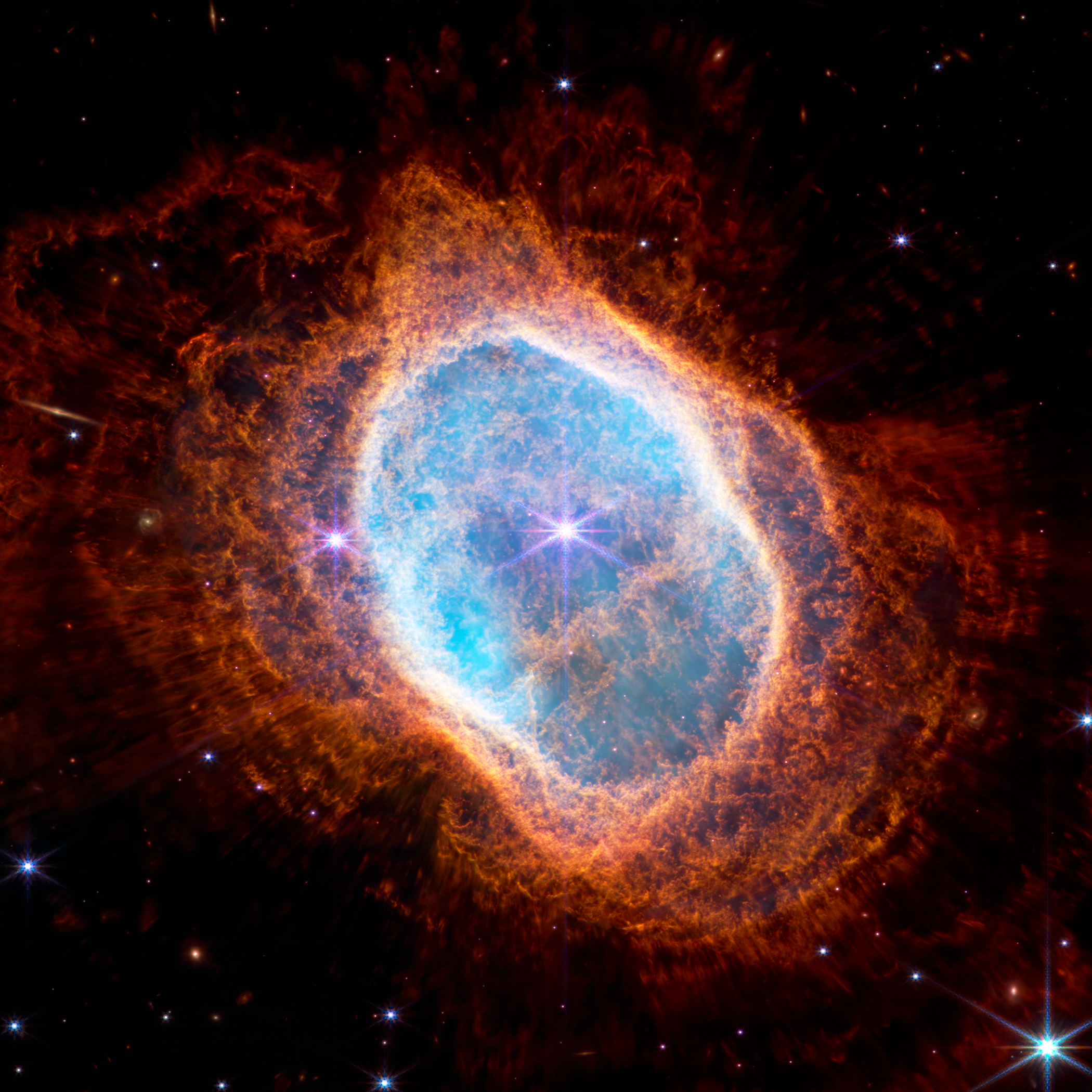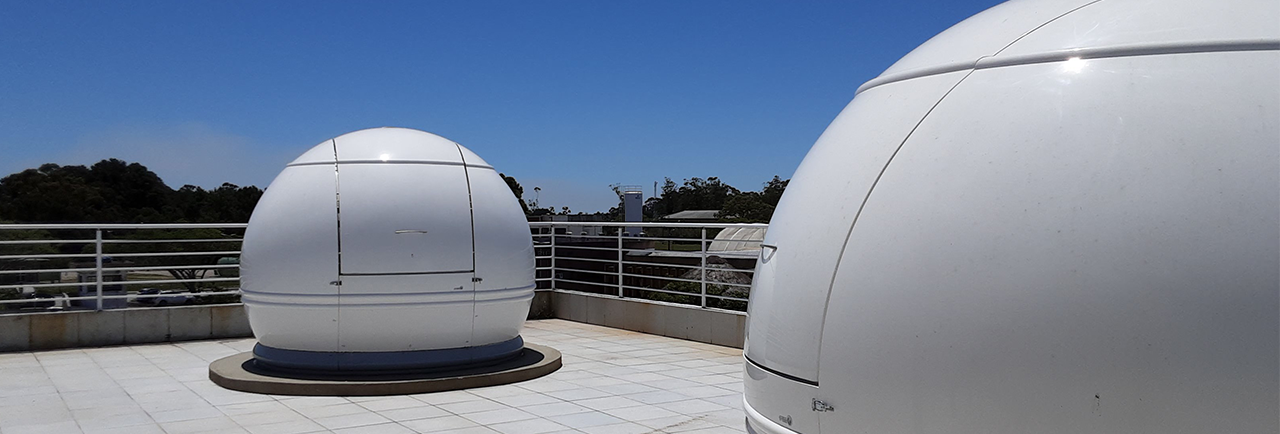Home
Astronomy and Astrophysics at FURG
 Astronomy is the oldest science. Exciting discoveries are being made today with the most sophisticated tools and techniques available. However, dedicated amateurs can still make significant contributions. The FURG observatory has two domes for optical telescopes with electronic tracking. In addition to monitoring through sophisticated software, virtual planetariums, an auditorium for scientific lectures, and a human capital full of joy and enthusiasm for astronomy. They are mainly the heart and soul of the new University Observatory. Here, various scientific, technological, and educational activities will be offered to all residents of Rio Grande. This includes lectures on astronomy and related areas, astronomical observations, mini-courses on specific astrophysical topics, colloquiums, guided tours, and much more.
Astronomy is the oldest science. Exciting discoveries are being made today with the most sophisticated tools and techniques available. However, dedicated amateurs can still make significant contributions. The FURG observatory has two domes for optical telescopes with electronic tracking. In addition to monitoring through sophisticated software, virtual planetariums, an auditorium for scientific lectures, and a human capital full of joy and enthusiasm for astronomy. They are mainly the heart and soul of the new University Observatory. Here, various scientific, technological, and educational activities will be offered to all residents of Rio Grande. This includes lectures on astronomy and related areas, astronomical observations, mini-courses on specific astrophysical topics, colloquiums, guided tours, and much more.
 The etymology of the word "Astronomy" implies that it was the discipline involved in the "arrangement of the stars." Today we can say that astronomy is our attempt to study and understand celestial phenomena, part of the incessant desire to discover order in nature. We don't know who the first astronomers were – what we do know is that the science of astronomy was well advanced in parts of Europe by the middle of the third millennium BCE and that the Chinese people had astronomical schools as early as 2000 BCE. In all ages, since the flowering of human intelligence, there have been people fascinated by the heavens and their changing aspect, and these people, to the extent that their cultural environment allowed them, attempted to formulate cosmologies. We are no different today. Currently, the term "Astrophysics" is also used to describe the study of celestial bodies. In fact, many astronomers use both terms quite generally. The question may well be asked "What is the difference between Astronomy and Astrophysics?" Very loosely, Astronomy can be defined as the subject of "where and when" related to the description of a celestial body with the "why and how" being covered more by Astrophysics. Instead of trying to provide a strict and fast rule for terminology, IMEF FURG has 3 research groups in the areas of Astronomy/Astrophysics (ASTROFURG, ASTROesul & ASTRO-Teo-Com) to cover all aspects of describing the heavens and the Universe. These groups are present in the coordination of the FURG Observatory. The entire universe is at your disposal; everyone is welcome.
The etymology of the word "Astronomy" implies that it was the discipline involved in the "arrangement of the stars." Today we can say that astronomy is our attempt to study and understand celestial phenomena, part of the incessant desire to discover order in nature. We don't know who the first astronomers were – what we do know is that the science of astronomy was well advanced in parts of Europe by the middle of the third millennium BCE and that the Chinese people had astronomical schools as early as 2000 BCE. In all ages, since the flowering of human intelligence, there have been people fascinated by the heavens and their changing aspect, and these people, to the extent that their cultural environment allowed them, attempted to formulate cosmologies. We are no different today. Currently, the term "Astrophysics" is also used to describe the study of celestial bodies. In fact, many astronomers use both terms quite generally. The question may well be asked "What is the difference between Astronomy and Astrophysics?" Very loosely, Astronomy can be defined as the subject of "where and when" related to the description of a celestial body with the "why and how" being covered more by Astrophysics. Instead of trying to provide a strict and fast rule for terminology, IMEF FURG has 3 research groups in the areas of Astronomy/Astrophysics (ASTROFURG, ASTROesul & ASTRO-Teo-Com) to cover all aspects of describing the heavens and the Universe. These groups are present in the coordination of the FURG Observatory. The entire universe is at your disposal; everyone is welcome.
How to get to the FURG Astronomical Observatory
 Astronomy is the oldest science. Exciting discoveries are being made today with the most sophisticated tools and techniques available. However, dedicated amateurs can still make significant contributions. The FURG observatory has two domes for optical telescopes with electronic tracking. In addition to monitoring through sophisticated software, virtual planetariums, an auditorium for scientific lectures, and a human capital full of joy and enthusiasm for astronomy. They are mainly the heart and soul of the new University Observatory. Here, various scientific, technological, and educational activities will be offered to all residents of Rio Grande. This includes lectures on astronomy and related areas, astronomical observations, mini-courses on specific astrophysical topics, colloquiums, guided tours, and much more.
Astronomy is the oldest science. Exciting discoveries are being made today with the most sophisticated tools and techniques available. However, dedicated amateurs can still make significant contributions. The FURG observatory has two domes for optical telescopes with electronic tracking. In addition to monitoring through sophisticated software, virtual planetariums, an auditorium for scientific lectures, and a human capital full of joy and enthusiasm for astronomy. They are mainly the heart and soul of the new University Observatory. Here, various scientific, technological, and educational activities will be offered to all residents of Rio Grande. This includes lectures on astronomy and related areas, astronomical observations, mini-courses on specific astrophysical topics, colloquiums, guided tours, and much more. The etymology of the word "Astronomy" implies that it was the discipline involved in the "arrangement of the stars." Today we can say that astronomy is our attempt to study and understand celestial phenomena, part of the incessant desire to discover order in nature. We don't know who the first astronomers were – what we do know is that the science of astronomy was well advanced in parts of Europe by the middle of the third millennium BCE and that the Chinese people had astronomical schools as early as 2000 BCE. In all ages, since the flowering of human intelligence, there have been people fascinated by the heavens and their changing aspect, and these people, to the extent that their cultural environment allowed them, attempted to formulate cosmologies. We are no different today. Currently, the term "Astrophysics" is also used to describe the study of celestial bodies. In fact, many astronomers use both terms quite generally. The question may well be asked "What is the difference between Astronomy and Astrophysics?" Very loosely, Astronomy can be defined as the subject of "where and when" related to the description of a celestial body with the "why and how" being covered more by Astrophysics. Instead of trying to provide a strict and fast rule for terminology, IMEF FURG has 3 research groups in the areas of Astronomy/Astrophysics (ASTROFURG, ASTROesul & ASTRO-Teo-Com) to cover all aspects of describing the heavens and the Universe. These groups are present in the coordination of the FURG Observatory. The entire universe is at your disposal; everyone is welcome.
The etymology of the word "Astronomy" implies that it was the discipline involved in the "arrangement of the stars." Today we can say that astronomy is our attempt to study and understand celestial phenomena, part of the incessant desire to discover order in nature. We don't know who the first astronomers were – what we do know is that the science of astronomy was well advanced in parts of Europe by the middle of the third millennium BCE and that the Chinese people had astronomical schools as early as 2000 BCE. In all ages, since the flowering of human intelligence, there have been people fascinated by the heavens and their changing aspect, and these people, to the extent that their cultural environment allowed them, attempted to formulate cosmologies. We are no different today. Currently, the term "Astrophysics" is also used to describe the study of celestial bodies. In fact, many astronomers use both terms quite generally. The question may well be asked "What is the difference between Astronomy and Astrophysics?" Very loosely, Astronomy can be defined as the subject of "where and when" related to the description of a celestial body with the "why and how" being covered more by Astrophysics. Instead of trying to provide a strict and fast rule for terminology, IMEF FURG has 3 research groups in the areas of Astronomy/Astrophysics (ASTROFURG, ASTROesul & ASTRO-Teo-Com) to cover all aspects of describing the heavens and the Universe. These groups are present in the coordination of the FURG Observatory. The entire universe is at your disposal; everyone is welcome. 







